- Home
- Jeff Mariotte
Time and Chance Page 9
Time and Chance Read online
Page 9
But it made her feel good. If that was sick, then she was sick. And she wouldn't be seeking medical help for this disease.
Through a peephole, she took another look at her next victim. Telford loved this kind. While it was true that with the syringe she carried and the "magic elixir" it contained, she could make anyone her prey, old or young, weak or strong, wealthy or poor, she was drawn to wrecks like this one. This man had made his choices and ended up here, where she could do whatever she wanted without fear of consequences. It made her feel god-like. Or at least like an avenging angel.
A part of her regretted having to use the solution she carried. She'd rather this scum remember what had been done to him. Unlike civilized people, who didn't respond well to physical violence, filing lawsuits, alerting the police, he had nowhere left to go, no one he could complain to.
She sighed. Regardless of her personal wants, she had a job to do. At least she would remember. Her flesh would be alive with the memory for some time to come.
She touched the button that activated the wall panel. It swung open and she stepped into the outside room of the brownstone.
"You're trespassing," she said.
The man rubbed his eyes. "I'm sorry, lady. I didn't think…"
"Save it."
She advanced on him, drawing her nightstick from a loop on her Sam Browne belt. She slapped her palm with it.
"I'll go," he said. "No problem. Forget I was ever here."
"I won't be the one who forgets," she said. He struggled unsteadily to his feet, as if preparing to leave. She faced him. He was taller than her, close to six feet. But he was intoxicated, weakened from poor nutrition, worn out from the streets. He didn't have a chance.
She slipped the nightstick back into its loop. She'd use her hands for this one.
She started with a sharp jab to the belly. The man doubled over, and she met his chin with an uppercut. His head snapped back. She followed it with an open hand, caught him beneath the jaw, and slammed his skull against the hard plaster wall.
His eyes glazed over, knees buckling.
Then she went to work.
For this, Wager exited his sanctum.
They met him in the larger sitting room, just outside. Comfortable leather sofas lined two walls, a low table with a bowl of nuts on it between them. A couple of chairs faced the sofas. The lighting was indirect, from floor lamps facing toward the ceiling. Drinks could be served from a bar in one corner.
Suzanne held the man's left arm. Raymond held his right. Lee stood just behind him.
The man smiled, but without real humor. Polite, Wager thought. And subservient. That's good. That'll make this easier.
"You may call me Wager," he said. The man started to put his hand out to shake, then pulled it back, probably noticing that Wager had not offered his. "And you are Joe, they tell me?"
"Joe Monteleone," he said. Wager observed, happily, that Joe Monteleone was in good physical condition, especially for someone who lived on the streets. Probably he had not been without a home for very long, and he'd taken care of himself in his former life. He was a handsome man, in his mid-thirties, Wager guessed. He'd have sandy blond hair, when it was clean. He was in need of a shave and a bath now, and he could use some dental work, but he appeared to have a strong jaw, a straight, slightly prominent nose, and clear brown eyes.
"It's a pleasure to meet you, Joe Monteleone. Please, have a seat. Care for a glass of water? He can have water can't he, Lee?"
"Water's fine," Lee said.
Suzanne and Raymond released Joe's arms and he sat on one of the couches. She took a seat close by while Raymond went to the bar. Lee chose one of the chairs, and Wager sat in the other one.
"Do you have any idea what you're doing here, Joe?" Wager asked.
Joe scanned the room, the faces, all with a curious expression. "No, I guess I don't," he said.
"You're making history, Joe. Did you ever think that you would make history?"
"There was a time I thought I might," Joe replied. "But that was a very long time ago."
"Recapture that feeling, my friend. Because you will. You are. I am a very wealthy man, Joe. And I am about to make you an offer, in the terms of that old movie, that you can't refuse."
"What kind of offer?"
Raymond returned with a silver tray on which ice cubes clinked in four tumblers of water and one of cranberry juice. He served the juice to Wager first, then passed out the waters.
Wager took a long drink from his glass before answering. "I would like to buy you."
"Excuse me?" Joe asked.
"To purchase you. To own you."
Joe started to rise from the sofa. "I think you've got the wrong guy," he said. "I'm not for—"
But before he could even get all the way to his feet, Suzanne put one hand on his right knee. Exerted pressure. The knee gave and he dropped back into his seat.
"You haven't even heard my offer," Wager said. "Trust me, it will be to your liking."
"I don't think so," Joe said.
"Take a look at yourself," Wager urged him. "What are you? Homeless? A drifter? A bum?"
"I've been called that."
"And do you have a family, Joe?"
"I—yeah, I do. Haven't seen much of them lately."
"But you'd like to provide for them. Make sure that they're taken care of."
"Well, sure. Who wouldn't?"
"You might be surprised, how little regard some people have for their families, Joe. But I'm glad you're one of the good people."
"I don't really have anywhere better to be, Wager," Joe said. "But even so, if you'd get to the point."
"Very well, Joe. I can understand your curiosity about this. It must all seem very strange to you."
"You got that right."
"I am something most people only hear about in the newspapers, or in whispers, Joe. Something that doesn't come along very often in this world. I am a true criminal mastermind. I am on the verge of owning New York. And I don't plan to stop there."
"Sounds like delusions of grandeur to me."
Wager's face darkened. No one dared intimate that he was anything less than sane, ever. Who was this—
But he checked himself. He needed Joe. He'd have Joe, one way or another. But having Joe's cooperation would be the easier way.
"Not at all, I assure you. I only need one more thing to make it all happen, Joe."
"What's that?"
"You. I need you."
"Why me?"
"The reason I say I want to own you, Joe, is that I need you to do as you're told without question, with blind obedience. I need you to accept whatever is done to you, willingly and immediately. I need you to follow orders. To submit your will to mine."
"I'm not really that kind of guy."
"I can't promise that you won't be hurt. In fact, you might not survive it at all. But if you do, you'll be a changed man. Stronger, more powerful than you have ever dreamed of. In so many ways. And whatever happens, whether you live or die, your family will be taken care of. They'll live in high style, for the rest of their lives."
"You can guarantee that?" Joe asked.
"I can, and do. You have my word on that. I already have a legal contract written up to that effect, which I will sign as soon as we agree to the deal."
"What do I have to do?"
And Wager had him, as simple as that. Once he asked that question, there was less than a one in ten million chance that he would try to back out. Almost a statistical impossibility.
"Nothing to it," Wager said. "It turns out, Joe, that your biochemistry and mine are almost identical. We could practically be brothers. Closer than brothers, in some ways. Isn't that right, Lee?"
'That's right," Lee replied. "Matches in the ninety-two percent range."
"I love percentages," Wager explained. "I use them. I play them. They help me get what I want. Ninety-two is a good one, and it'll help you get what you want too."
"That still doesn't ans
wer my question," Joe said. "What do I have to—"
"I need to test something. A substance I acquired recently that will bestow upon its user powers unimagined. I intend to take it myself, but not before I know approximately what it will do to me. I don't want to accidentally take a lethal dose, but I want to take enough to guarantee a successful transformation."
"So you're looking for a guinea pig."
"Aptly stated. A guinea pig whose body's responses will closely resemble my own. What I'm going to give you will most likely make you an immensely powerful being. Once that happens, even though you will be physically stronger than me, you will still belong to me, do you understand that? You must swear to me your absolute allegiance, as long as you live. Otherwise, the deal is off, and your family will not only not be taken care of, they will be killed. Remain loyal to me, and your family thrives. Betray me once, and they die. It's easy to remember, wouldn't you say?"
"I think I got it."
"Good. Then what do you say?"
"Where's that contract?"
Four hours later, Carl Malone woke up in an empty gravel parking lot in New Jersey. He ached everywhere. When he touched his face, he flinched from the soreness. And there was a stinging on the inside of his elbow. Rolling up his sleeve, he saw a little mark, like he had given blood.
He couldn't remember how he got here. Or where he'd been. He scoured his memory, but the last thing he could clearly bring up was the night before, drifting to sleep inside a cardboard box near a train track. It had been cold and damp, he recalled. After that, though—nothing.
Next to him, he noticed, stood a brown paper bag. He looked inside.
A bottle of Thunderbird, brand new, unopened. Life was good.
CHAPTER SIX
After a little more than an hour, some of the missing started to drift back into the Mary McCardle Shelter. Sarah sat with a cup of bad coffee that had cooled while she waited. Bobby was in the kitchen, talking in low tones with Jose. When the bell on the door tinkled, though, he shoved through the double doors and joined Sarah on the floor.
The first one in was a woman named Marcia. She was a regular, and they both recognized her. She came in through the glass door, stopped just inside the dining room, and looked around it as if it were all new to her.
"Hello, Marcia," Sarah said.
"Hello," Marcia said. She blinked a couple of times, staring at Sarah's face.
Sarah gave her a smile, trying for welcoming and concerned at the same time. "Is everything okay?"
"I guess so," Marcia said.
"Where've you been?" Sarah asked. "Did you go somewhere with the others?"
Marcia stroked her chin with the stubby fingers of her right hand. Her left held the brown plastic grocery bag she used as a suitcase/purse. She blinked again. "I don't think so," she said. "Maybe. I don't remember, really."
"Are you hungry?" Bobby asked.
"I hadn't really thought about it," she said. "But now that you mention it…"
Bobby turned, stuck his head back through the kitchen doors. "Jose," he called. "See what you can get started. I'll come back and help in a minute."
"Gotcha," Jose responded.
The bells chimed again and a couple more people walked in. Each had a similar expression to Marcia's— something like confusion. Like they know they're supposed to be here, Sarah thought, but aren't exactly sure where "here" is.
Sarah went to the door, opened it, and looked outside. The cold air hit her like a brick of ice. Down the street, she saw more of them coming, walking back slowly, as if just strolling randomly in this direction. But she recognized all of them. They were just about the only people on the street, and they were all headed toward her.
When they reached the door, she held it open, and tried to greet each one by name. "Hi, Pat," she said. "Terry. Hello, Elizabeth. Hi, Linda." They gave her blank looks, or forced smiles, but none of them seemed quite sure who she was.
As the parade wound down, Sarah went back to the kitchen to find Bobby working with Jose on a vat of spaghetti. Bobby was watching a simmering pot of meat sauce.
She sniffed the air. "You couldn't use a vegetarian sauce?"
"Hey, they need protein," Bobby argued.
"There are other sources of protein," she said. "Anyway, let's not get into a dietary debate now. I need to talk to you." She cocked her finger at him and he followed her from the kitchen. She led him toward a quiet spot near the hallway.
"I don't know what's going on, but something freaky has happened to these people," she said.
"You mean, in addition to them losing their homes and loved ones?"
"I mean today, just now. They act like they don't even know who I am."
"But every one of them has been here before, Sarah," Bobby pointed out. "They've all met you."
"That's what I mean, nimrod. They've met me, but they're looking at me like they have no memory of it. Something's happened to them, some kind of mass hypnosis or something."
"Have you tried asking them?"
"Not yet. I thought maybe we should both talk to a couple of them, so one of us doesn't miss something."
"Okay. Want to do it in the office, or what?"
"I'll see if Jennifer will let us," Sarah said. "Be right back."
She started toward the office, then stopped, looked back over her shoulder at Bobby. "You didn't put any pork in that sauce, did you? Or organ meat?"
"It's all beef," Bobby assured her.
"Probably rain forest beef," she said with a sneer. She went into the administrative office.
Ten minutes later, they sat in the office with Tyrone. He was a tall African-American man in his late fifties, with a grizzled salt-and-pepper beard and shoulders as wide as a city bus. He'd worked construction until a falling I-beam broke his back. After that, he'd become addicted to painkillers, and, unable to find steady employment, had gone through a number of part-time jobs. He ended up unemployable, and on nights he couldn't get into a shelter he slept on top of a subway grate. He was big enough that he was allowed to sleep pretty much wherever he wanted, and the other homeless people in his neighborhood didn't object when he took the best spots.
"I remember a man comin' in here," Tyrone was saying. "No, it was two folks, two men. They talked to Ms. Stone for a minute—" naming the tall silver-haired woman who had recently begun volunteering and who, Sarah noted, had not been seen since these people left the shelter. "—and then one of them, he got up in front of the room, right where Jennifer or Elaine stand when they want to talk. This guy, he said something about how he had an opportunity for us to earn a little spendin' cash, we wanted to go with him. Well," he chuckled, a low, throaty laugh. "Figure that went for most of us, so we followed him out the door."
He tapped his temple with one finger. "I can't quite recollect where we followed him to, though. Or what we did, once we got there. But I looked in my pockets, just a few minutes back, and I can tell you what ain't there. Spendin' cash. Not a nickel."
"I'm sorry you were used like that," Sarah said. "Without getting the payment you were promised. If you can remember anything about where you were taken, I swear we'll collect on that promise."
"It was a building," Tyrone said. "Like an office or some such. But I can't remember any more than that. It all just goes dark, until I was almost back here. First thing I can recall after that was seein' you standin' there in the doorway, Ms. Sarah."
"Do you feel any different?" Bobby asked. "You weren't hurt or anything, were you?"
"My arm feels pretty sore, now you mention it," Tyrone replied. "Like someone punched it pretty hard."
"Can we see?" Sarah asked him.
"I'm a little shy about takin' my shirt off in front of you, Ms. Sarah," he said. "I ain't had a real shower or nothing for a while."
"We can probably get you a shower tonight," she said. "I'll talk to Jennifer, see if we can't get showers and beds for everyone who went with those men."
"That'd be nice."
"In the meantime, if you want to just show me your arm," Bobby said, "I'm sure Sarah won't mind stepping into the hall."
"I can do that," Sarah said. She rose from her chair, went out the door, and shut it gently behind her. When she was gone, Tyrone pulled off his coat, then peeled a sweater over his head, and started to unbutton his ragged blue work shirt.
A few minutes later, Bobby met Sarah in the hallway. "He's been injected with something," he said. "Or had blood drawn, one of the two. He's got a needle mark right here." He indicated the inside of his elbow.
"And it's fresh?"
"He says it is," Bobby replied. "Still sore. Must have just happened." .
"Let's talk to some of the others."
"I'm with you."
"Needle guns, Sunbursts, plasma blasters—this stuff is all I.O. issue, Mr. Lynch," Caitlin said. "But it's all over the streets of New York, and God knows where else."
Jack Lynch sat in his desk chair, which he'd swiveled to look out the window at the city beyond. The view from here was staggering, the kind that people paid vast amounts of money to claim for themselves.
Lynch was paying it, too. He didn't mind. Money was only good if you spent it, and he'd cheated death too many times to want to hang onto any. He could keep the kids in some degree of comfort here in an opulent Manhattan hotel suite, keep them supplied with whatever equipment they needed, and oversee their work.
Not like he'd done before, though. In the early days of the team he'd been coach, cheerleader, owner, and medic. They were all dealing with being kids, having incredible powers they could barely comprehend, and being on the lam from International Operations grunts working for those who had caused their powers to manifest in the first place.
Gen13 were the sons and daughters of Team 7 members, of which Lynch was one. His own son, Bobby, still used the name Lane—one of his many foster families— instead of taking Lynch for his own. Caitlin and Roxy were half-sisters, daughters of Alex Fairchild with two different mothers.
They'd all been taken away to a secret installation in the California desert, trained, and experimented on, in an attempt to bring their hidden powers to the fore. And it had worked. The kids became superheroes. But Ivana Baiul, who ran Project Genesis, didn't care much for the "heroes" aspect of that. She wanted the kids to work for her, super-soldiers or super-enforcers of her will. They rebelled against that idea, and her, and went on the run. I.O.'s Keepers chased them as long as they could, but Lynch managed to hide them out in La Jolla, California, for a while. Then they went on the move again, to the Florida Keys, and finally here to New York.

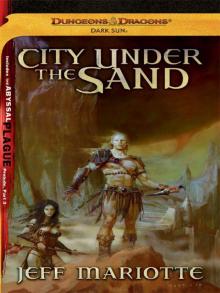 City Under the Sand
City Under the Sand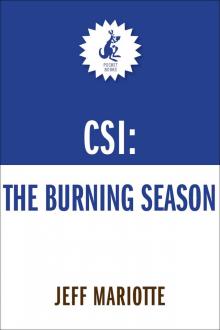 The Burning Season
The Burning Season Sanctuary
Sanctuary Winds of the Wild Sea
Winds of the Wild Sea Serpents in the Garden
Serpents in the Garden Close to the Ground
Close to the Ground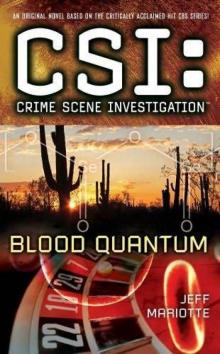 Blood Quantum
Blood Quantum Brass in Pocket
Brass in Pocket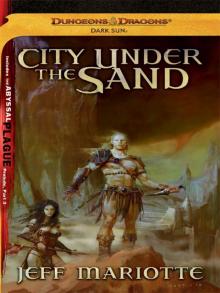 City Under the Sand: A Dark Sun Novel (Dungeons & Dragons: Dark Sun)
City Under the Sand: A Dark Sun Novel (Dungeons & Dragons: Dark Sun)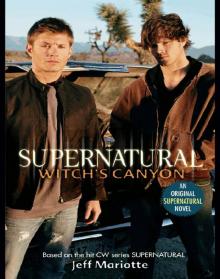 Witch's Canyon
Witch's Canyon STAR TREK: The Lost Era - 2355-2357 - Deny Thy Father
STAR TREK: The Lost Era - 2355-2357 - Deny Thy Father Dawn of the Ice Bear
Dawn of the Ice Bear The Xander Years, Vol.2
The Xander Years, Vol.2 Ghost of the Wall
Ghost of the Wall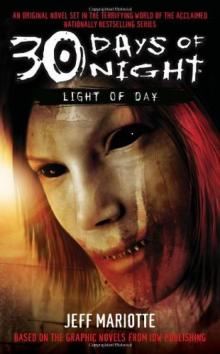 30 Days of Night: Light of Day
30 Days of Night: Light of Day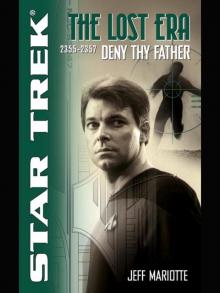 Deny Thy Father
Deny Thy Father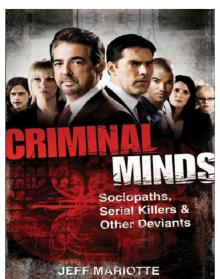 Criminal Minds
Criminal Minds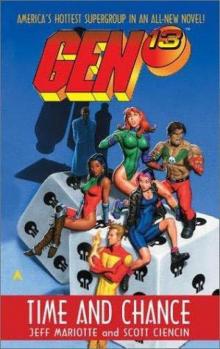 Time and Chance
Time and Chance The Folded World
The Folded World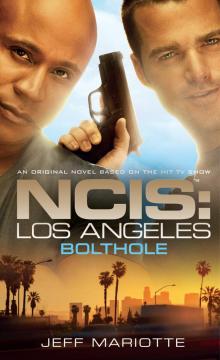 Bolthole
Bolthole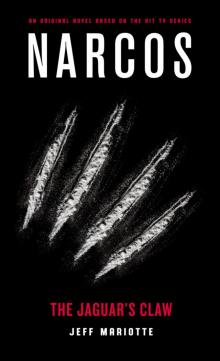 Narcos
Narcos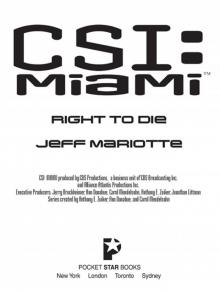 Right to Die
Right to Die